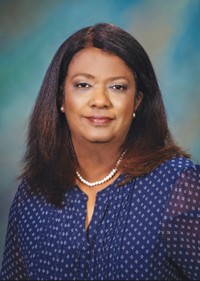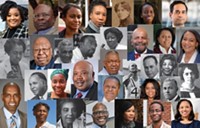Advertisement
Grab your lab coat. Let's get started
Welcome!
Welcome!
Create an account below to get 6 C&EN articles per month, receive newsletters and more - all free.
It seems this is your first time logging in online. Please enter the following information to continue.
As an ACS member you automatically get access to this site. All we need is few more details to create your reading experience.
Not you? Sign in with a different account.
Not you? Sign in with a different account.
ERROR 1
ERROR 1
ERROR 2
ERROR 2
ERROR 2
ERROR 2
ERROR 2
Password and Confirm password must match.
If you have an ACS member number, please enter it here so we can link this account to your membership. (optional)
ERROR 2
ACS values your privacy. By submitting your information, you are gaining access to C&EN and subscribing to our weekly newsletter. We use the information you provide to make your reading experience better, and we will never sell your data to third party members.
Careers
Advancing Black Chemists
May 28, 2007
| A version of this story appeared in
Volume 85, Issue 22
In "Chemists of Color," Bethany Halford discusses the paucity of black chemists in the workforce and subsequently gives examples and interviews people about this issue (C&EN, March 26, page 46). However, a glaring and irresponsible omission is the recognition of the three-decade effort to address the issues of African American scientists by the National Organization for the Professional Advancement of Black Chemists & Chemical Engineers (NOBCChE).
Founded in 1972, NOBCChE's mission is to build an eminent cadre of African American scientists and engineers by providing a forum for technical exchange for minority technology professionals as well as for graduate and undergraduate students, and to encourage precollege students into the STEM (Science, Technology, Engineering & Math) disciplines. NOBCChE's members number over 4,000 and include technology professionals in industry, government, and academia as well as students pursuing degrees in the sciences at all levels. NOBCChE works with these sectors to provide scholarships for those pursuing both undergraduate and advanced degrees in chemistry and has bestowed over $1 million in industry-sponsored scholarships.
In addition, NOBCChE is influential in national science and technology policy, playing a major role in the recommendations for the creation of the National Science Foundation's Centers of Excellence at Minority-Serving Institutions, especially at Historically Black Colleges & Universities (HBCUs). The recipients of NOBCChE's highest award for scientific excellence, the Percy Julian Award, include notables such as Willie May (National Institute of Standards & Technology), James Mitchell (AT&T Bell Labs), and William Lester (University of California, Berkeley).
NOBCChE's annual conferences have provided a forum for U.S. policymakers to present their vision for where NOBCChE can make a difference in the nation's quest to remain a leader in science and technology. Speakers have included Christine Todd Whitman, former director of EPA; Shirley Jackson, president of Rensselaer Polytechnic Institute; Jim Turner, deputy director of the National Institute of Standards & Technology; and John H. Marburger III, director of the Office of Science & Technology Policy.
At every NOBCChE annual conference for more than a decade, hundreds of middle and high school students participate in the NOBCChE National Science Bowl. Multicultural teams from across the U.S. compete for top honors by answering questions in science and mathematics. The feature that distinguishes NOBCChE's Science Bowl is that the questions are interspersed with those on the contributions of African American inventors, scientists, and engineers. With its diverse team makeup (black, white, yellow, and brown), this competition becomes a novel way to expose students of different racial and ethnic backgrounds to the technology achievements of African Americans. Thus, NOBCChE is preparing not only the next generation of technologists but also a generation that embraces and is knowledgeable of the contributions of diverse colleagues in science and engineering.
The article mentions the value of mentorship for black chemists by white colleagues in a professional environment. However, NOBCChE is invaluable when it comes to the retention and encouragement of minority scientists to persevere professionally when faced with enormous obstacles in the workplace. In "Beyond Small Numbers: Voices of African American Ph.D. Chemists" by Willie Pearson Jr. of Georgia Institute of Technology (Elsevier, 2005), his interviews with African American chemists found that "NOBCChE is absolutely necessary." His research noted that many value NOBCChE as an outlet to publish papers and give presentations in an environment where people do not feel lost in a large organization.
His research goes on to say that NOBCChE provides opportunities for networking among professional scientists and engineers as well as for mentoring students to prepare them for the professional phase of their life. NOBCChE has developed and recognized many of the current and future leaders in chemistry and chemical engineering, including members interviewed in the C&EN article: Isiah Warner, NOBCChE vice president; Chris Hollinsed, former NOBCChE awards chair; and Marquita Qualls, former NOBCChE president and a member of the C&EN advisory board.
Finally, NOBCChE and ACS have been partners for over 10 years with the goal of understanding where both organizations can be supportive of each other's missions. And such a goal is built on trust and mutual respect. When four pages of an ACS publication are devoted to the issues of black chemists in the workforce and there is not a single mention of NOBCChE, I really have to reexamine the commitment of ACS toward increasing the numbers of minority scientists. NOBCChE is an invaluable resource to the nation, especially as it faces the challenges of globalization. NOBCChE should be recognized as such.
Victor R. McCrary, president-elect
NOBCChE





Join the conversation
Contact the reporter
Submit a Letter to the Editor for publication
Engage with us on Twitter